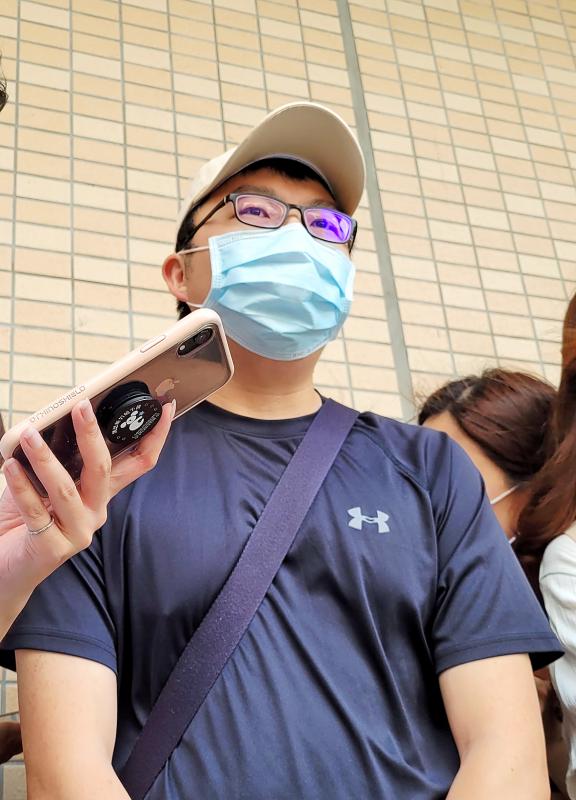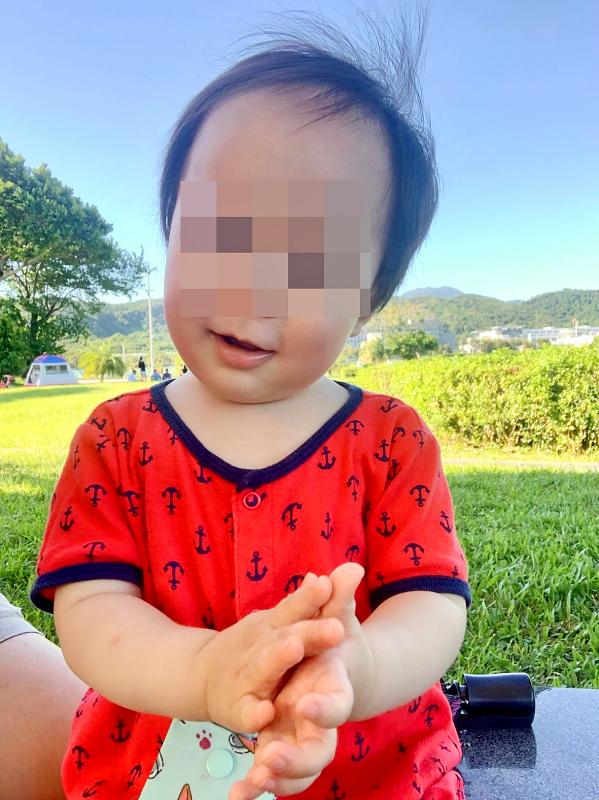The father of a two-year-old boy who last month died of COVID-19 yesterday asked why it took more than an hour to find an ambulance to take his son to a hospital, saying the delay led to his son’s death.
“What exactly happened during those 81 minutes?” he wrote on Facebook.
The boy died on April 19 following six days of treatment in an intensive care unit at Shuang Ho Hospital in New Taipei City’s Jhonghe District (中和).

Photo: Lai Hsiao-yung, Taipei Times
He was the first child in Taiwan to die of COVID-19 since the pandemic began in 2020.
Attributing the cause of the child’s death to the rapid deterioration of his condition after he developed severe symptoms, the hospital said at the time that he died of brain stem encephalitis resulting from septicemia triggered by COVID-19.
Prior to the boy’s death, nobody under 30 had died of COVID-19 complications in Taiwan.

Photo courtesy of EnEn’s family
“After En En [恩恩, the boy’s name] tested positive for the disease with a high fever, we repeatedly called the Jhonghe District Public Health Center, but the call was never answered. We called the New Taipei City Fire Department, which asked us to get approval from the health center first, and then dialed 119 four times before an ambulance was dispatched,” the father said. “We waited 81 minutes for the ambulance to come, and that was the hardest and longest time in our lives.”
“Recalling the situation, we were utterly hopeless and as his father I feel great regret and heartbreak,” he said. “I want the authorities to tell us the truth. Why it took 81 minutes for the ambulance to come, and why En En was only able to get to the hospital 91 minutes later.”
The father said he and his wife have sent an application to the New Taipei City Government, the Centers for Disease Control, Jhonghe health center and the 1922 hotline, asking them to release the call records.
In response to media queries yesterday, New Taipei City Mayor Hou you-yi (侯友宜) refrained from commenting, saying only that “every life must be treasured and everything possible must be done to prevent such a tragedy from happening again.”
New Taipei City Department of Health Director Chen Ran-chou (陳潤秋) said “everything that should have been done was done,” and the ambulance was dispatched in accordance with Communicable Disease Control Act (傳染病防治法) guidelines.
Minister of Health and Welfare Chen Shih-chung (陳時中), who heads the Central Epidemic Command Center, yesterday said that recordings of 1922 hotline calls are preserved for a year, and an applicant should present their ID to access the recordings.

Chinese Nationalist Party (KMT) Chairman Eric Chu (朱立倫), spokeswoman Yang Chih-yu (楊智伃) and Legislator Hsieh Lung-chieh (謝龍介) would be summoned by police for questioning for leading an illegal assembly on Thursday evening last week, Minister of the Interior Liu Shyh-fang (劉世芳) said today. The three KMT officials led an assembly outside the Taipei City Prosecutors’ Office, a restricted area where public assembly is not allowed, protesting the questioning of several KMT staff and searches of KMT headquarters and offices in a recall petition forgery case. Chu, Yang and Hsieh are all suspected of contravening the Assembly and Parade Act (集會遊行法) by holding

PRAISE: Japanese visitor Takashi Kubota said the Taiwanese temple architecture images showcased in the AI Art Gallery were the most impressive displays he saw Taiwan does not have an official pavilion at the World Expo in Osaka, Japan, because of its diplomatic predicament, but the government-backed Tech World pavilion is drawing interest with its unique recreations of works by Taiwanese artists. The pavilion features an artificial intelligence (AI)-based art gallery showcasing works of famous Taiwanese artists from the Japanese colonial period using innovative technologies. Among its main simulated displays are Eastern gouache paintings by Chen Chin (陳進), Lin Yu-shan (林玉山) and Kuo Hsueh-hu (郭雪湖), who were the three young Taiwanese painters selected for the East Asian Painting exhibition in 1927. Gouache is a water-based

Taiwan would welcome the return of Honduras as a diplomatic ally if its next president decides to make such a move, Minister of Foreign Affairs Lin Chia-lung (林佳龍) said yesterday. “Of course, we would welcome Honduras if they want to restore diplomatic ties with Taiwan after their elections,” Lin said at a meeting of the legislature’s Foreign Affairs and National Defense Committee, when asked to comment on statements made by two of the three Honduran presidential candidates during the presidential campaign in the Central American country. Taiwan is paying close attention to the region as a whole in the wake of a

OFF-TARGET: More than 30,000 participants were expected to take part in the Games next month, but only 6,550 foreign and 19,400 Taiwanese athletes have registered Taipei city councilors yesterday blasted the organizers of next month’s World Masters Games over sudden timetable and venue changes, which they said have caused thousands of participants to back out of the international sporting event, among other organizational issues. They also cited visa delays and political interference by China as reasons many foreign athletes are requesting refunds for the event, to be held from May 17 to 30. Jointly organized by the Taipei and New Taipei City governments, the games have been rocked by numerous controversies since preparations began in 2020. Taipei City Councilor Lin Yen-feng (林延鳳) said yesterday that new measures by